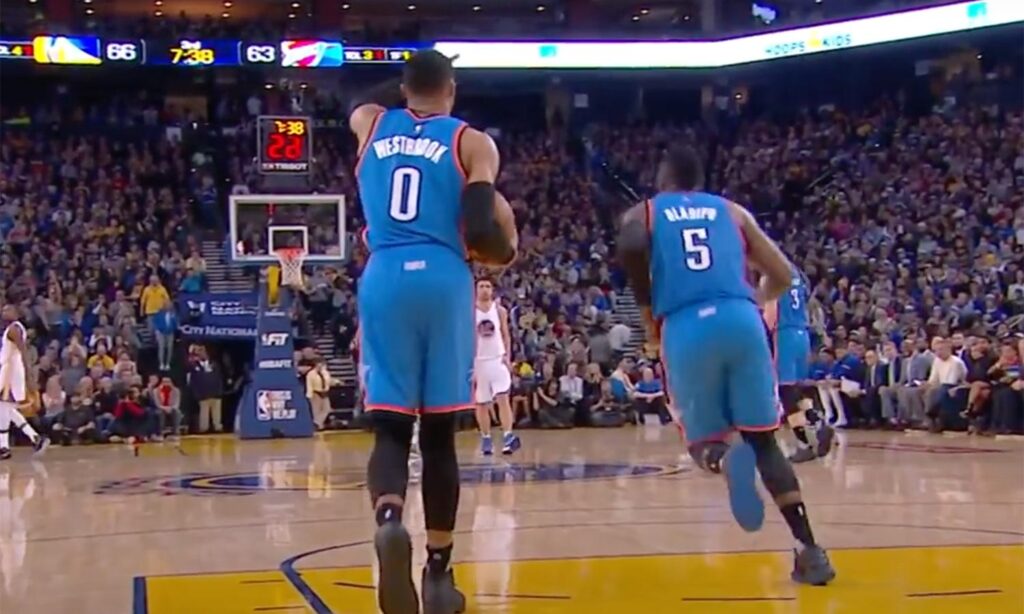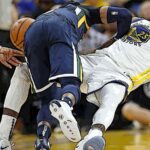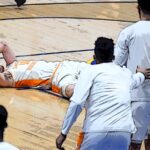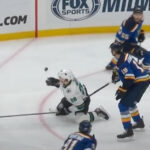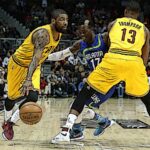Just like any other sport, there are rules in basketball that players must adhere to.
Depending on the rule being violated, the individual player, the team or both may be penalized.
For instance, if a player makes an illegal contact with their opponent, they will be charged with a foul.
Some rule violations are simply illegal plays, but punishments are not as severe. They may simply result in turning the ball over to their opponent.
A good example is when a team does not attempt a shot within 24 seconds of ball possession, known as a 24-second shot clock violation.
Another known possession turnover stems from the travel rule. Players are most likely to break this rule inadvertently, but what exactly is it?
What does travel mean in basketball?
Travel or “traveling” is a rule violation where the player takes more than two steps with the ball without actively dribbling. The NBA allows for a “gather step”, making it appear that players have taken a third step at the end of their dribble. A travel violation results in the referee blowing the play dead, and the opposing team handed possession of the ball.
As mentioned earlier, players are likely to break this rule by accident rather than purposely looking to get away with it.
Some are blatant, while the rest are mostly conspicuous.
For entertainment purposes, here’s a montage of some of the worst travel violations ever in the NBA. We are talking players going beyond the illegal third step.
But the NBA has eased up on the travel rule the last few years, allowing for what they now call a “gather step”.
Gather Step Explained
The “Gather” itself is defined as the point where the player holds the ball with both hands, causes the ball to pause or rest, or they have enough control of the ball to be able to shoot, pass, shoot, grip or cradle it.
The gather step is also known as the “zero” step.
The player can proceed with the next two steps and either attempt a shot or pass.
So long as they don’t maintain the ball in their possession after these two steps, they are not in violation of the travel rule.
Lastly, the gather step has been made famous by none other than James Harden.
In his case, the gather step along with the additional two steps is collectively known as the Step Back.
Below is a video of him using this technique to create space between him and his opponents for a clear shot at the basket.
The Pivot Foot
Once the player takes their first step after gathering the ball, it becomes the pivot foot after making contact on the court again.
The pivot foot must stay planted in place to keep the player from violating the travel rule.
That is, they cannot lift or drag the pivot foot while holding the ball without getting called for travel.
However, they can freely rotate the foot or pivot on that center point.
The other foot is free to move anywhere you want so long as the pivot foot remains anchored in place.
When was the Travel rule introduced?
The travel rule was introduced at the onset of the game dating back to 1891. Back then, players were not even allowed to dribble, but could only pass the ball to one another.
Dribbling was first incorporated into the rules back in 1909. Players could continuously dribble and were also allowed to shoot off the dribble too. (source)
Originally, when players were called for travel, they would be assessed a personal foul.
Only in 1922 was the travel rule changed from a foul to a game violation.
Lastly, the Gather Step was only recognized by the NBA as of the 2019. They wanted to distinguish between the zero step and the actual first step once the player stopped dribbling.
Final Thoughts
While I'll always view the Gather Step as a cheat to the rules I grew up with, it does add more excitement to the game.
From my perspective, this third step adds to the element illusiveness or trickery to the game.
Players can now give themselves more space and time to shoot the ball or even make an effective pass.
Let's hope the referees will continue to properly call traveling and not let the players get away with too many of its rule violations.
Players should get called out for their mistakes, especially when earning millions of dollars a year to play top level basketball.
